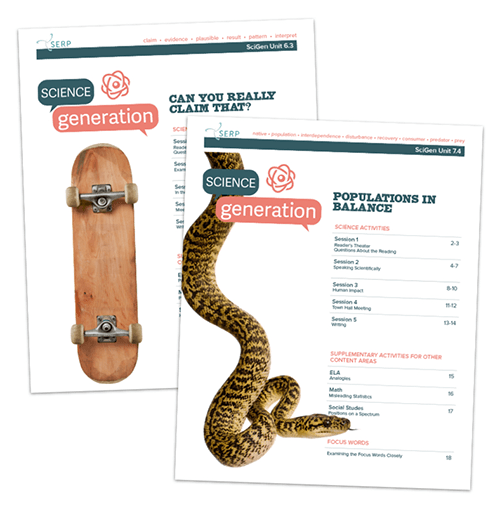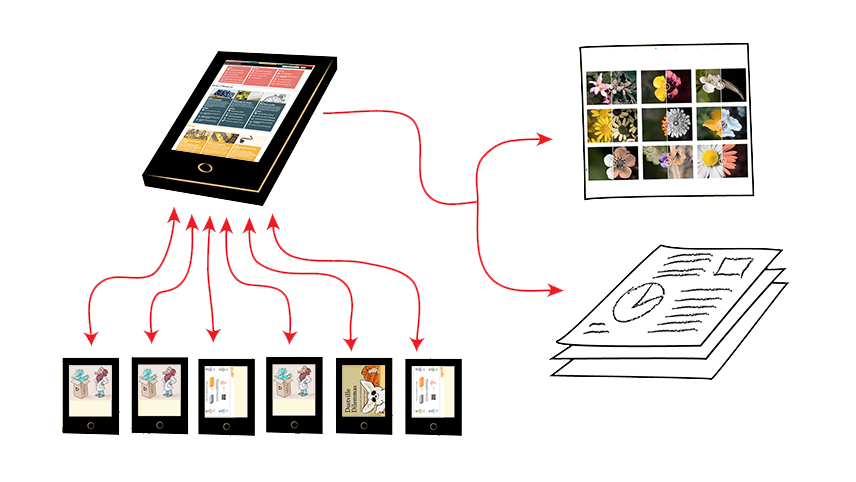Go to Free PDFs & SciGen Teacher Dashboard
Middle School Science Units that Support Disciplinary Literacy
Science Generation (SciGen) addresses science topics commonly taught to 6th, 7th, and 8th graders. These curricular materials can be used in place of the standard curriculum materials, or as a supplement. They provide opportunities to read, write, discuss, and build arguments about basic questions in science.
Each week-long unit is comprised of 40-50 minute science lessons each day and highlights 5–10 academic words. There are also supplementary activities for other content areas to continue the cross-disciplinary benefits of Word Generation. All activities relate to the central question or topic of the week, build relevant knowledge, and provide opportunities to encounter the new academic vocabulary in multiple semantic contexts. By bringing the scientific knowledge closer to students’ lives, they are equipped with both the background knowledge and the tools to engage in scientific argumentation.
Why should science teachers teach disciplinary literacy?
Unfortunately, even students who make a strong start on literacy in the early elementary grades often don’t develop the skills they need to tackle science and other informational texts in the later elementary years. Students need special help to rise to the challenge of reading to learn science. They need not only general literacy but disciplinary literacy, skills specific to reading and producing texts in science.
Science teachers often hold a tacit “vaccination model” of literacy, an assumption that ELA teachers will dose kids with enough general literacy to be ready for science class. However, science teachers themselves are in the best position to help their students grow in the disciplinary literacy specific to science. Students will do best when their science teachers regard teaching science literacy as part of their job.
Two Versions to Support Disciplinary Literacy in Science
Science Generation
Printable Student Booklets with Teacher Editions
The original version of Science Generation was made as 18 student booklets with accompanying teacher editions. They include text-based and hands-on activities such as:
- Reader’s Theater
- Speaking Scientifically
- In the Lab
- Discussion/Debate
- Writing
- Brief connections to ELA, math, and social studies
SciGen Teacher Dashboard
Web-based Teacher Lesson Plans with a variety of teaching assets
This new version of SERP's Science Generation materials has been made in a very different way than the previous version. Instead of materials in the form of student booklets with teacher editions, we have instead made digital lesson plans for teachers. The lesson plans contain visuals for teachers to project, interactive activities to share with students, labs, and some PDF handouts as well. There are no student booklets, per se. Also in this version are helpful "teacher tune-ups" that address content-related questions that teachers told us would be helpful.
Science Generation (SciGen) was inspired by WordGen Weekly, SERP's first Word Generation program.
Much of the information on the WordGen Weekly website is also very helpful to teachers using SciGen. Especially...
Development of Word Generation was led by Catherine Snow (Harvard University) and Suzanne Donovan (SERP). Major SERP contributors to program development include: Claire White, Alyse Krantz, Halley Wheeless, Matt Ellinger, David Dudley, and Patrick Hurley. Boston Public Schools and other districts in Massachusetts and Maryland collaborated with SERP to develop of Word Generation.
Support for Word Generation was provided by the Carnegie Corporation of New York, the William and Flora Hewlett Foundation, the Noyce Foundation, the Spencer Foundation, the Leon Lowenstein Foundation and the Institute of Education Sciences, U.S. Department of Education through grant numbers R305A090555 and R305F100026. The information provided does not represent views of the funders.
The SciGen Teacher Dashboard was supported by Science Sandbox, a Simons Foundation initiative dedicated to engaging everyone with the process of science.
This work is licensed under a Creative Commons Attribution-NonCommercial-ShareAlike 4.0 International License.


